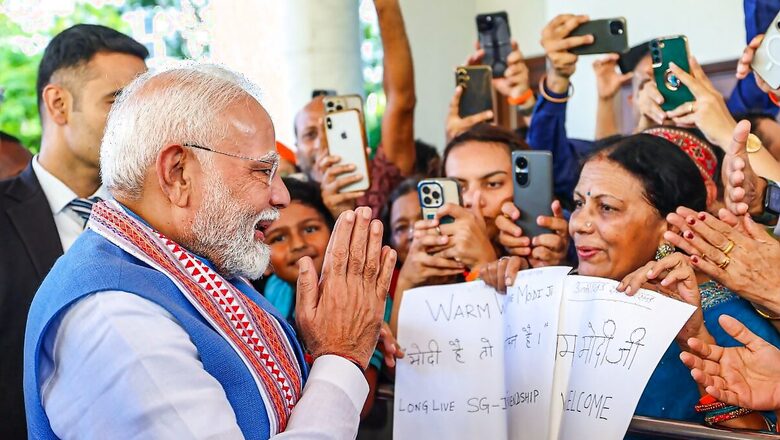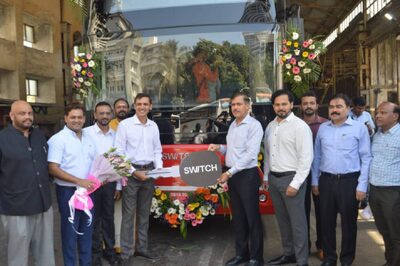
views
While the dust from the 2024 general elections campaign has barely settled down, the public discourse in India has been witness to bizarre political theories and illogical political constructs. Flipping common-sense and logic on its head are a new crop of pundits who have sought virtue in the Congress’ failure to cross double digits in seat tally while stretching the limits of arithmetic to delegitimise the BJP-led NDA pre-poll alliance’s simple majority in the Lok Sabha.
This debasement of the public discourse is reflective of a broader phenomenon that is unfolding across social media platforms where rumours and conspiracy theories have become the norm while exaggerated extreme arguments have set the tone. The studios of mainstream media have been no exception either with routine brawls and scuffles, high decibel name calling the new normal. Lost in this miasma of asinine arguments is the significance of the 2024 general elections and what it tells us about Narendra Modi’s exceptional leadership within the context of seven decades of Indian democracy.
To best appreciate what makes Modi’s leadership at the helm of Indian democracy exceptional, one must consider the following facts about India’s other long-serving Prime Ministers. India’s first Prime Minister Jawaharlal Nehru had a long six-year run at the helm of the Constituent Assembly before he faced the Indian electorate for the first time in the 1951-1952 general elections. Being Prime Minister by default since 1947 put him at a distinct electoral advantage when India voted for the first time. His next significant successor Lal Bahadur Shastri never really faced the electorate in a general election to make his case for Prime Minister having passed away less than two years in office.
Indira Gandhi who succeeded Shastri got a helping hand in the form of a three-year shortcut to Parliament through the Rajya Sabha before actually facing the Indian electorate for the first time in 1967 to make her case to be Prime Minister of India. Rajiv Gandhi, her son, inherited her premiership following her tragic assassination, thus facing the electorate for the first time in 1984 with a distinct advantage. Dr Manmohan Singh, who matched Indira Gandhi in serving two consecutive terms as Prime Minister, never faced the Indian electorate taking the safe route of the Rajya Sabha through both his terms. It is also noteworthy that much of Indira Gandhi’s second term was mired by Emergency when democracy remained suspended in India.
There are only two Prime Ministers in India’s democratic history who served two full democratic terms having duly been elected by the people of India — Nehru and Modi. Of the two it is only Modi who has the twin distinctions of not only making the arduous trek to Delhi from a state capital serving as a Chief Minister but having done so by making his case to the people democratically in an open election. The absence of a six-year runway that benefited Nehru before his first election, the absence of a Rajya Sabha shortcut that benefited both Indira Gandhi and Manmohan Singh and the absence of familial inheritance as was the case with Indira Gandhi and Rajiv Gandhi, is what makes Narendra Modi’s leadership as Prime Minister of India for three consecutive terms exceptional in the history of Indian democracy.
Modi’s third term as Prime Minister is unique and exceptional within the landscape of Indian elections, for it has occurred in an era of extreme electoral competition, unlike in 1962 when Nehru faced the Indian electorate for a third term with barely any political challenge. Modi’s exceptional third term also comes in an era of 24×7 political scrutiny on social media and unprecedented levels of election interference by both global media outlets and international NGOs with potential State support. It is this significance that has been lost in the cesspool of public discourse that is conducted daily across both social media and mainstream media. While exaggerated assertions on a so-called ‘diminished mandate’ are being made to synthesise a narrative to delegitimise Modi’s third term, it is significant that Modi continues to remain the longest standing democratic leader in the global arena at a time when every major democracy has seen both political turmoil and change in leadership.
The rollercoaster of Indian electoral politics has come to mean that an election to a state assembly every six months would be viewed as a de-facto referendum on Modi. Such severe electoral scrutiny, which has decelerating effect on both policymaking and economic decision-making, notwithstanding it is to Modi’s credit that he has remained steadfast to his commitment to Indian democracy and the Constitution. Steering the world’s largest and only billion people democracy with its socio-extremities and geo-linguistic diversity is not only an exhausting mess affair but nerve wracking for any leader who is held to account 24×7 by his constituents.
As he turns 74, India’s Prime Minister Narendra Modi has the most thankless job in the history of democracy not only within its short seven decades in India but over the past three centuries having to administer the nation in the face unceasing domestic challenges and during geo-politically unpredictability making him an exceptional leader for exceptional times.
The writer is the former CEO, Prasar Bharti. Views expressed in the above piece are personal and solely that of the author. They do not necessarily reflect News18’s views.




















Comments
0 comment